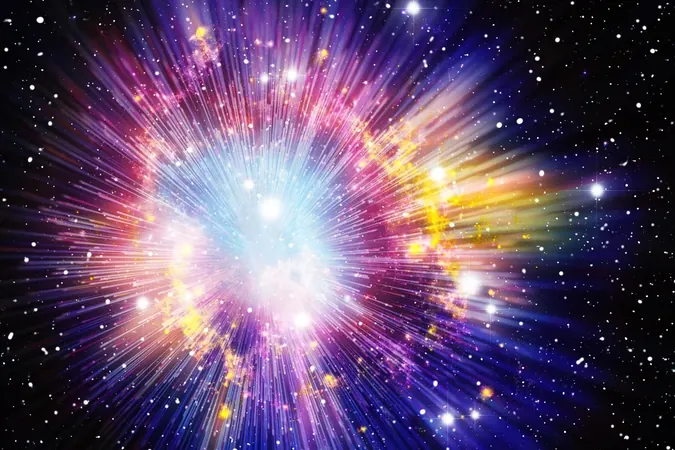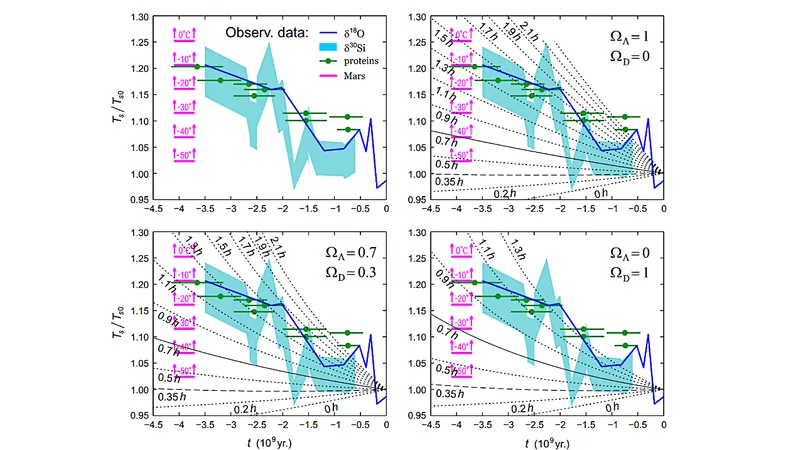
Scientists Challenge Inflation Theory: A New Era for Understanding the Universe
2025-07-28
Author: Yu
A Groundbreaking Assertion from Harvard and Cambridge
In a stunning development for cosmology, Dr. Sunny Vagnozzi from the University of Cambridge and Professor Avi Loeb of Harvard University assert that the widely accepted inflation theory of the Big Bang could be on shaky ground. This revolutionary contention hinges on the potential discovery of the cosmic graviton background (CGB), a signal that could rewrite our cosmic narrative.
What is Cosmic Inflation?
Cosmic inflation refers to a brief period of rapid expansion just moments after the universe was conceived. This theory has long served as an explanation for the uniformity we observe in the cosmos and the distribution of galaxies. Yet, many critics argue that inflation's myriad forms make it nearly impossible to test scientifically. If one version fails, another simply takes its place.
A New Glimmer of Hope
Vagnozzi and Loeb present a bold hypothesis: if we could confirm the existence of the CGB, we could independently verify or refute the inflation theory in a way that previous observations have failed to do. Vagnozzi observes, "Inflation was designed to address fine-tuning issues of the hot Big Bang model, but its flexibility raises serious questions about its scientific validity."
The Quest for the Cosmic Graviton Background
Delving into the physics, the CGB is envisioned as a relic radiation emitted from graviton particles—hypothetical carriers of gravity—that might have escaped the hot, dense early universe approximately 10^{-43} seconds after the Big Bang. This background radiation, expected to exist at around 0.9 Kelvin, would be a telling remnant of the universe’s early days.
Why Detecting the CGB Matters
Unveiling the CGB could be a game-changer. Current inflation theory suggests that the immense expansion would have diluted early graviton presence to the point of invisibility. Loeb underlines, "If the CGB is discovered, it would not only challenge inflation but also potentially unlock new understanding of quantum gravity—an esteemed goal for physicists for decades."
The Challenge Ahead
However, the task of detecting the CGB is monumental. High-frequency gravitational waves expected from this signal peak around 100 GHz, far beyond the capabilities of current gravitational wave detectors like LIGO and Virgo. Despite this, the researchers remain hopeful, suggesting that future cosmological probes could yield indirect evidence of the CGB through measurable changes in the universe's expansion.
A New Frontier in Cosmology
The inflation theory has traditionally been a cornerstone of cosmology, bridging gaps within the Big Bang framework. Yet, the versatility of inflation raises doubts over its testability, leading to excitement around the CGB search. Finding this elusive signal would force a reevaluation of our understanding of the cosmos.
What Awaits Us?
Finding the CGB could culminate in one of the most significant breakthroughs in science, offering unique insights into the universe's infancy, shaping our comprehension of quantum gravity, and questioning whether the universe emerged from a bang or a bounce. The stakes are high, and while challenges abound, the potential revelations are cosmic.




 Brasil (PT)
Brasil (PT)
 Canada (EN)
Canada (EN)
 Chile (ES)
Chile (ES)
 Česko (CS)
Česko (CS)
 대한민국 (KO)
대한민국 (KO)
 España (ES)
España (ES)
 France (FR)
France (FR)
 Hong Kong (EN)
Hong Kong (EN)
 Italia (IT)
Italia (IT)
 日本 (JA)
日本 (JA)
 Magyarország (HU)
Magyarország (HU)
 Norge (NO)
Norge (NO)
 Polska (PL)
Polska (PL)
 Schweiz (DE)
Schweiz (DE)
 Singapore (EN)
Singapore (EN)
 Sverige (SV)
Sverige (SV)
 Suomi (FI)
Suomi (FI)
 Türkiye (TR)
Türkiye (TR)
 الإمارات العربية المتحدة (AR)
الإمارات العربية المتحدة (AR)